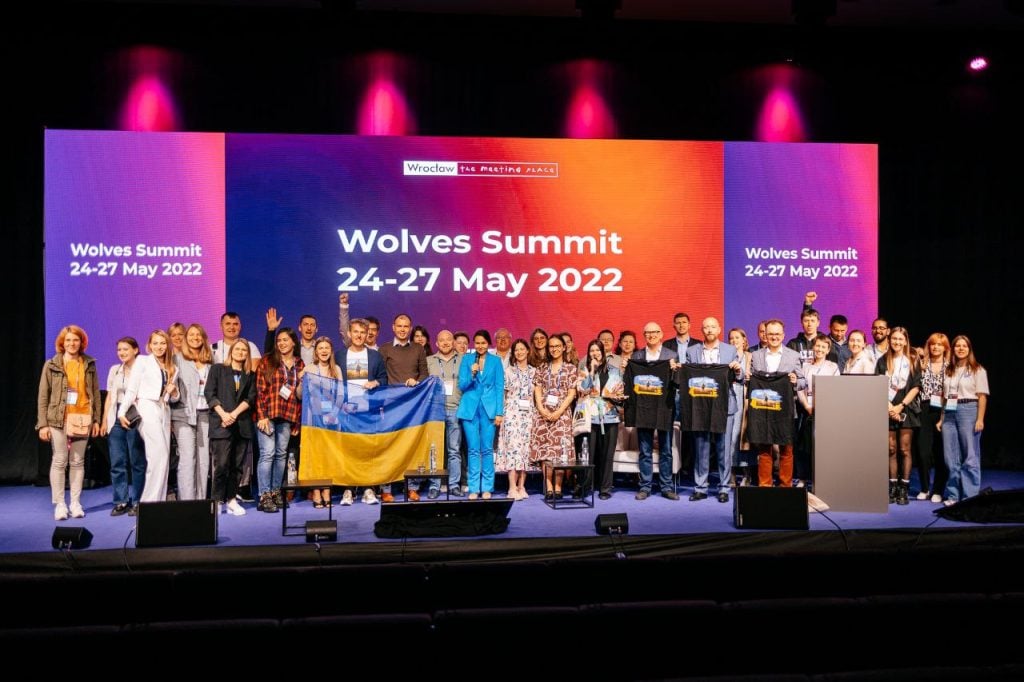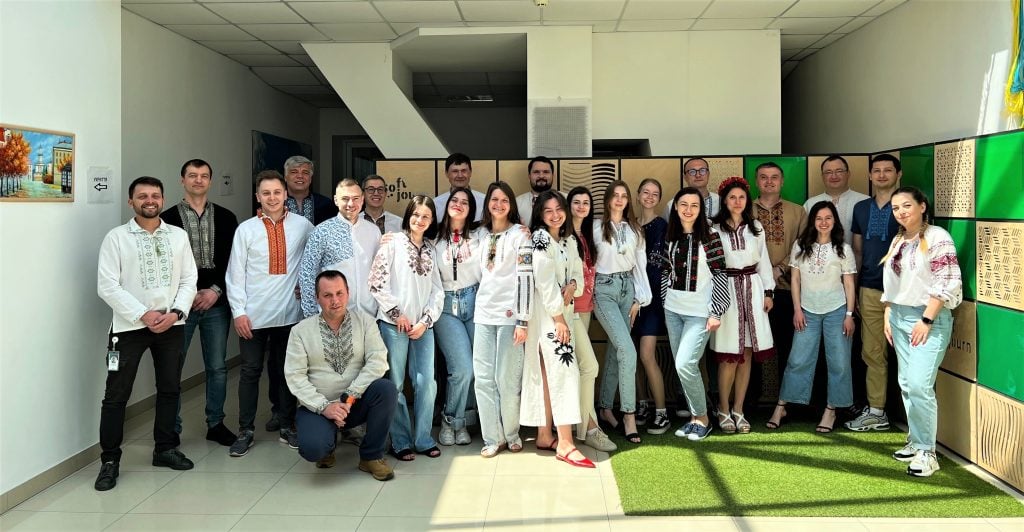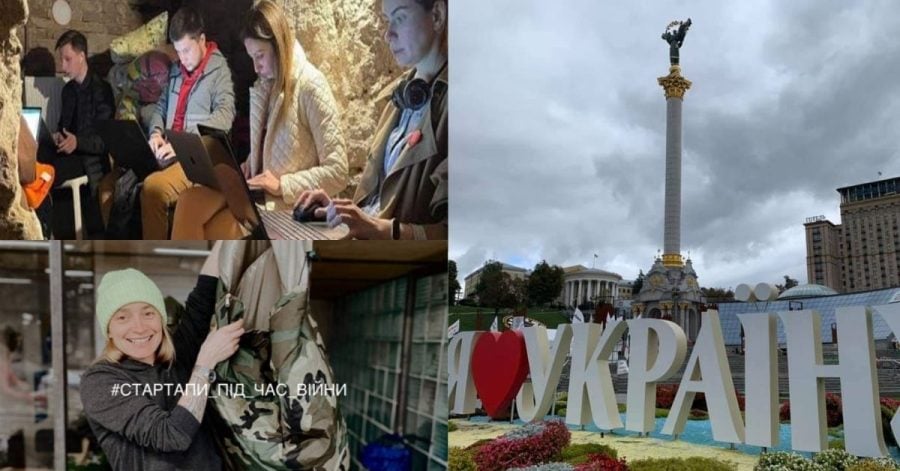In a tiny shelter with dimmed lights, all you can hear is the typing on keyboards. Nowadays, this is the reality for most Ukraine tech companies and especially startups that chose to continue working from the war-torn country.
As the war has been ravaging Ukrainian cities and villages for more than 100 days now, for most startups it is either staying in the shelters, or relocating their workers abroad.
While different startups made different choices, what is common for all of them is their resilience – they won’t give up on their businesses and look to use any available means to continue their operations while keeping their workers safe.
Surviving the first days of the war
The first day of Russia’s invasion of Ukraine was perhaps the most traumatic one for many startups and companies across the country, both founders and employees explain.
“On February 24, just one hour after the first rockets were launched on Ukraine’s cities, we declared emergency and began evacuating people and critical equipment from the affected cities: Kharkiv, Odessa, Dnipro, and Kyiv, to the safe areas of Ukraine,” Vitaly Sedler, CEO and co-founder of Intellias, a software company that provides custom software engineering services, recalls.
“Overall, we managed to evacuate most of the people to safe areas and currently restored service delivery in 97%+ capacity. By now, over 1000 employees and their families are relocated to safe areas of Ukraine and abroad,” Sedler tells The Recursive.
The worst birthday
Oleksandr Poliukh, lead DevOps (AWS) engineer at Intellias, had big plans for February 24, the day when he celebrates his birthday. However, that day Poliukh and his family woke up to a completely new reality in the city of Khmelnytskyi.
“February 24th started for me at midnight. My wife and daughter were congratulating me with my birthday. We went to sleep, waiting for another peaceful day filled with plans on celebration. Yet we woke up in a completely new reality and thus began the worst birthday I have ever had,” Poliukh tells The Recursive.
“I woke up at 4:17 and started watching the news. I woke up my wife and everyone around me, tried to explain what’s going on, yet it was hard to believe at first. We started packing the most important stuff, but the thought that all this isn’t real has been stalking us for a couple of hours,” he recalls.
Fortunately for Poliukh, his colleagues from Intellias Lviv office helped his family find a place to stay for a night.
Olesia Martynova, head of marketing for Europe at Intellias, was already in Lviv that day. She says that the shock came suddenly after many of her colleagues thought that it would be impossible for Russia to attack Ukraine.
“I can’t imagine Kyiv being bombed by Russians,” most of my colleagues said. The reality, however, appeared to be different. At 6 am the next day our friend called us: “Wake up, the war has started”. We turned on the TV and this divided our life into “before” and “after”,” Martynova recalls.
For her, the first hours of the war were the most difficult, as it was difficult to grasp what had started to happen in the country.
“Safety is something most of us took for granted and reshaping our minds in this respect was harder than one could imagine. My family and both mine and my husband’s parents were in Lviv, an area which is relatively safe, whereas our other relatives were distributed across the country and the key priority at that moment was to find a way to get them all together and make sure there is no threat to their lives,” Martynova says.
Is there really a business as usual mode?
Now, more than three months into the war, Intellias and other tech startups in the country are trying to be in a “business as usual mode” despite all of the difficulties and challenges that are out there.

iLogos Game Studios, an Ukrainian game development company, is one of them. The company was founded in Luhansk in 2006, and since then had the misfortune to twice face a similar situation – first in 2014, and now again in 2022.
Since then, iLogos works remotely with specialists from 15 countries and significant clients worldwide. Back in 2014, the company managed to relocate 300 game development professionals with their families to safer places.
When Russia struck again, the company was already more or less prepared – having its work pipelines fully remote for the last eight years, and, since the first Russian invasion of Donbas, it had its infrastructure and remote teams located in 13 countries.
Working under severe pressure and with a daily risk management
According to iLogos’ Chief business development officer (CBDO) Svitlanka Sergiichuk, Ukraine tech companies have to work under severe pressure and daily risk management, but so far most of them are managing this quite successfully.
“At iLogos Game Studios, at the first day of the war we have been operating at 70% capacity but now we are at 91% of capacity already, and are heading towards 100%. It is also important to make the business processes adaptable to the wartime operation,” Sergiichuk tells The Recursive.
However, there’s plenty of unexpected developments that management has to deal with at the moment, she points out.
“I remember I woke up in the first days of the war to the notification from our HR Department. They asked to confirm the budget for purchasing the gas masks because several people were in the areas under risks of chemical attacks at that point. “Wow, I would not expect myself approving budgets for gas masks 2 weeks ago”, I thought. And approved the budget, of course.” Sergiichuk recalls.
Another notification of the relocation teams was saying that employees required a guideline on how to cover windows with plywood if the glass was broken with an explosion wave, she says.
Just like Ukraine tech companies, foreign companies in the country are also using all available means to continue with their operations.
Softjourn, a US-based software development company with a R&D presence in Ukraine, is one of them.
When the war began, the company sought to move its workers in the country from the most dangerous regions of Ukraine to the Western part of the country or to their office in Poland.
“We’ve made some preparations to assure stable electricity and internet supply in our office in Ivano-Frankivsk and created different scenarios on how to react accordingly and make decisions. It took us a couple weeks to implement the majority of the plan,” Natalie Nykyforuk, head of HR at Softjourn tells The Recursive.
Remote work has helped productivity stay intact, Nykyforuk explains, as the company adapted to this type of work long before the war, amid the COVID-19 pandemic. In turn, this also helped Softjourn keep up with hiring Ukrainians too.

“We work in distributed teams with employees from all around the globe. We started this “Go global” initiative sometime before the full-scale war broke out and it’s been quite successful. We haven’t stopped hiring globally or in Ukraine for even a single day. Our recruitment team quickly adjusted to new conditions, and since the beginning of the war managed to fill dozens of positions, helping Softjourn to grow 12% globally and 10% in Ukraine alone,” Nykyforuk says.
Launching business operations into the international market
Aside from doing their business in Ukraine, current conditions also prompted some startups to launch their operations on the international market.
DocStudio is an e-document management platform that has been working in Ukraine for more than 15 years, with a focus on digitalization and synchronizing work with data at all stages of the retail and supply chain.
At the moment, some of the people from its team enlisted in the army, while almost everyone else is volunteering.
“For us, Ukrainians it is now important to be useful to each other, so we are a little distracted from the terrible events that are taking place in our country,” Zakhar Dikhtyar, co-founder of DocStudio, explains.
While all of DocStudio’s clients are in Ukraine, being present on the international market at this point will also encourage and give assurances to the startup’s workers.
“It is very important for us to give our team confidence in the future so that they feel protected and safe. Many Ukraine tech companies and startups need financial support, as well as business mentoring when entering the international market. To start a business in other countries, you need to understand the culture of doing business in countries, the mentality of potential customers, and legal rules,” Dikhtyar tells The Recursive.
Software development company VIMAS Group International has been working in the country since the beginning of the 1990s and is experiencing the same problems as young tech startups do – such as ensuring safety and stable salary payments for its employees, as well as to maintain their business operations.
“The main changes in my view are the emotional challenges that each employee and family members have solved and are solving,” Andrew Maksakov, president of VIMAS Group International, tells The Recursive.
When it comes to operation on the domestic market, the main problem is the narrowing compression of the market geography and all the general business restrictions that the war imposes on startups and investors, Maksakov adds.
“All Ukrainian and international startups that were connected with the infrastructure of Ukraine, of course, are now experiencing great difficulties. Those startups that work in the digital space and that have R&D groups in Ukraine continue to operate and work. So, the main need is peace – but peace will come only after war ends,” he concludes.








